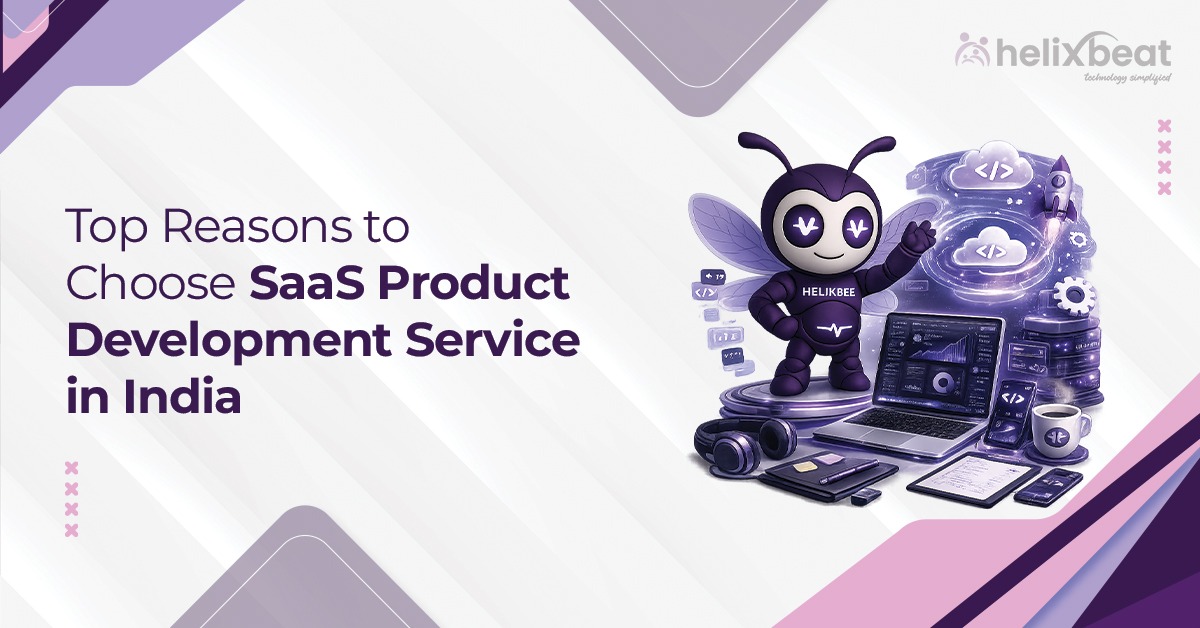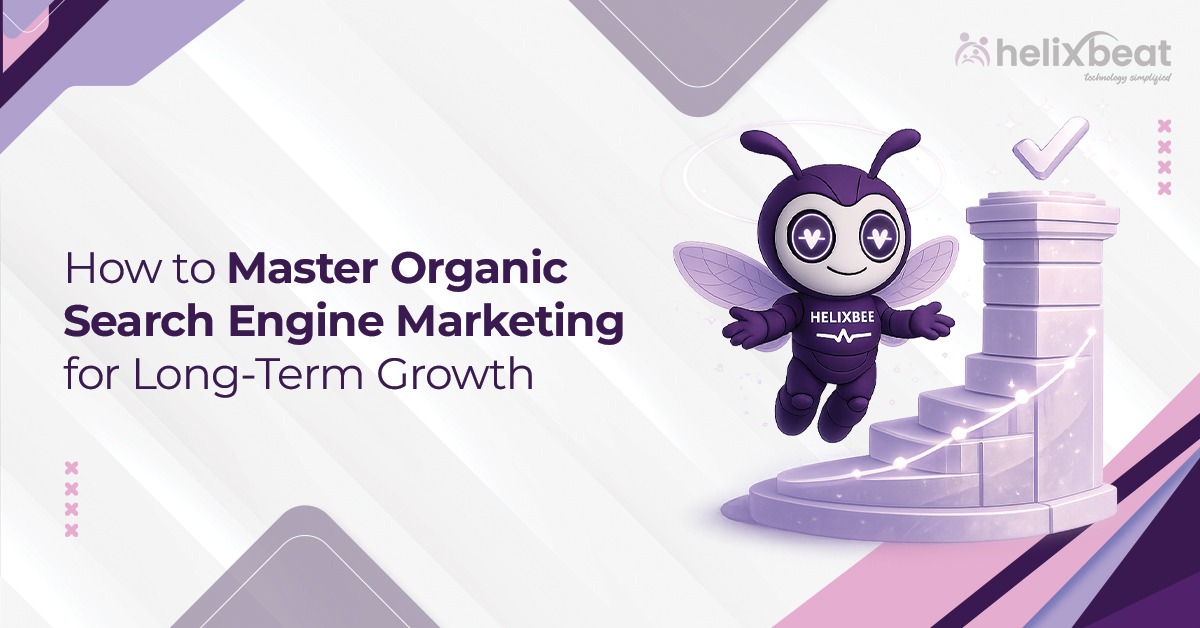Content is the king for any business. The information about your brand needs to be communicated to your audience in an eye-catching way. However, many people tend to use the terms “content strategy” and “content marketing” interchangeably. While they may seem similar, each plays its own role in a business and in sharing your message.
For example, if you think of content strategy as the plan, it’s the roadmap that guides everything you create and share. Content marketing, on the other hand, is the process of putting that plan into action—delivering helpful and engaging content to the right people at the right time. Understanding the difference between the two can help you build a more effective approach to your content, ensuring it doesn’t just exist but truly resonates with your audience.
The distinction between content marketing and content strategy is subtle because the two concepts work together. Once you figure it out, you can use them as the one-two punch to help grow your brand.
This post explains content marketing and content strategy and gives advice for using both to benefit your business.
Table of Contents
What is Content Strategy?
Content strategy is the process of planning, managing, and governing content throughout its lifecycle. It’s about understanding your goals, your audience, and the best ways to deliver value through content. A good content strategy is like a map—it guides everything you do, ensuring that every piece of content serves a purpose and aligns with your larger business goals.
For instance, imagine you own a coffee shop and want to create content that helps build your brand and attract new customers. Your content strategy would begin by asking the right questions:
- What do I want to achieve with my content?
- Who am I trying to reach?
- What kind of content will resonate with them?
Based on the answers to these questions, you would create a roadmap that guides the type of content you produce (e.g., blog posts, social media posts, videos), the channels you use (e.g., Instagram, website, email), and the tone or style of that content (e.g., fun and casual vs. professional and informative).
A good content strategy also involves the following:
- Audience Research: Understanding who your audience is and what they care about is crucial. You can’t create content that resonates unless you know your audience inside and out. For example, a coffee shop might target busy professionals, coffee enthusiasts, or local residents who enjoy spending time at the café.
- Content Planning: Deciding what types of content you will produce, how often, and in what format. Will you write blog posts on coffee brewing techniques? Share Instagram photos of latte art? Post behind-the-scenes videos from your shop? Planning this out ensures consistency and relevance.
- Goal Setting: Every piece of content should be tied to a specific goal. Are you trying to build brand awareness, drive foot traffic, or increase online orders? Your content strategy should outline the objectives you hope to achieve.
- Measurement & Analysis: A solid content marketing strategies also involves tracking performance. How will you measure success? Metrics such as website traffic, social media engagement, or sales conversions can help determine if your content is achieving your goals.
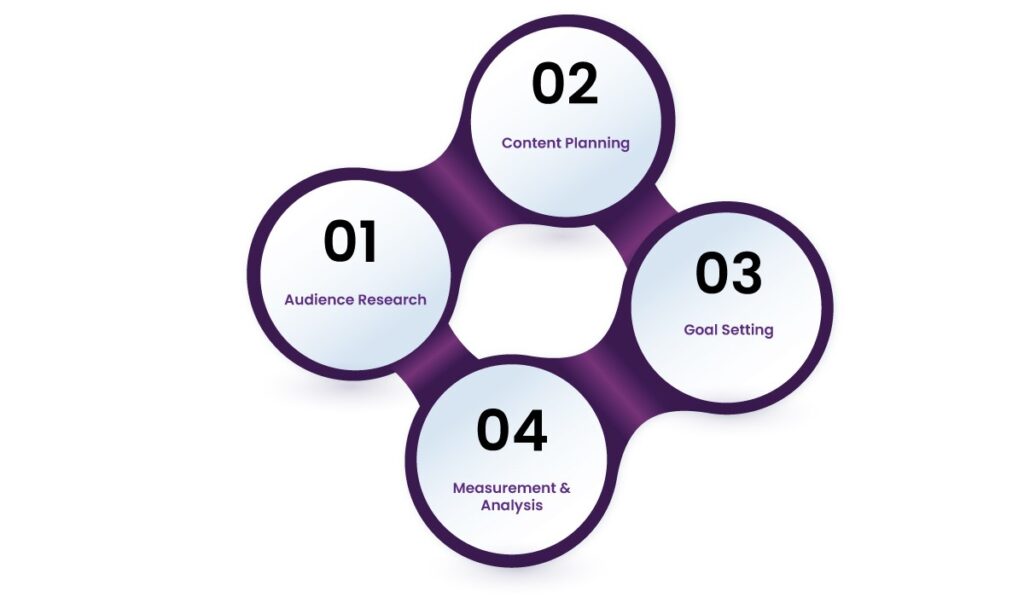
What is Content Marketing?
While content strategy is all about the planning and the “why,” content marketing is the execution—the “how.” Content marketing refers to the actual process of creating and distributing valuable content that attracts, engages, and retains your target audience. It’s the practice of delivering your content to the right people at the right time and making sure it meets their needs.
Let’s go back to our coffee shop example. Once you’ve defined your content marketing strategies, content marketing is about the actual delivery. For instance, you might create a blog post about the best coffee beans for brewing at home. Then, using content marketing tactics, you might:
- Share the blog post on social media: Posting it on Instagram, Facebook, and Twitter to reach your followers.
- Email the blog post to your subscribers: Sending a newsletter with the post to your loyal customers.
- Use SEO to drive organic traffic: Optimizing the blog post with keywords so people searching for coffee brewing tips on Google can find it.
- Partner with influencers: Collaborating with a popular food blogger to promote your coffee shop through sponsored content.
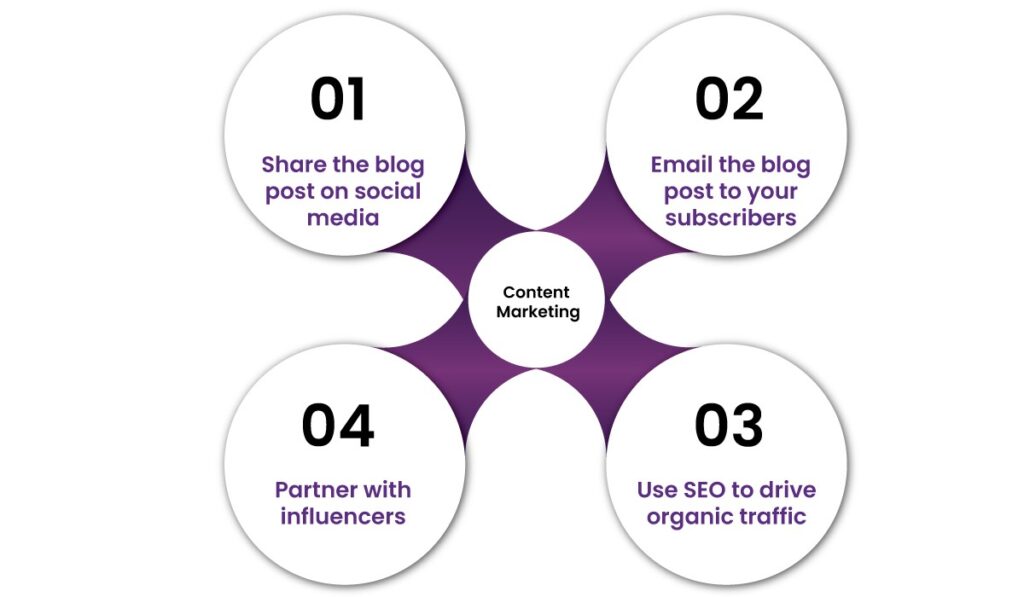
Content marketing is about putting the content marketing strategies into action and using various channels to amplify its reach. It’s an ongoing process that requires creativity, consistency, and an understanding of what will engage your audience.
There are several key elements to content marketing:
- Content Creation: Writing blog posts, creating videos, designing infographics, recording podcasts—whatever format fits your audience’s preferences.
- Content Distribution: Getting your content in front of the people who will benefit from it. This could mean posting on social media, running ads, sending email campaigns, or even using partnerships with other brands or influencers.
- Engagement: Responding to comments, liking and sharing posts, and fostering community through content. Engagement helps to build a loyal audience who not only consumes your content but also interacts with it.
- Optimization: Continuously tweaking your content based on performance metrics. If a certain type of post is getting more engagement, do more of it. If one platform isn’t driving as much traffic, you might shift your focus elsewhere.
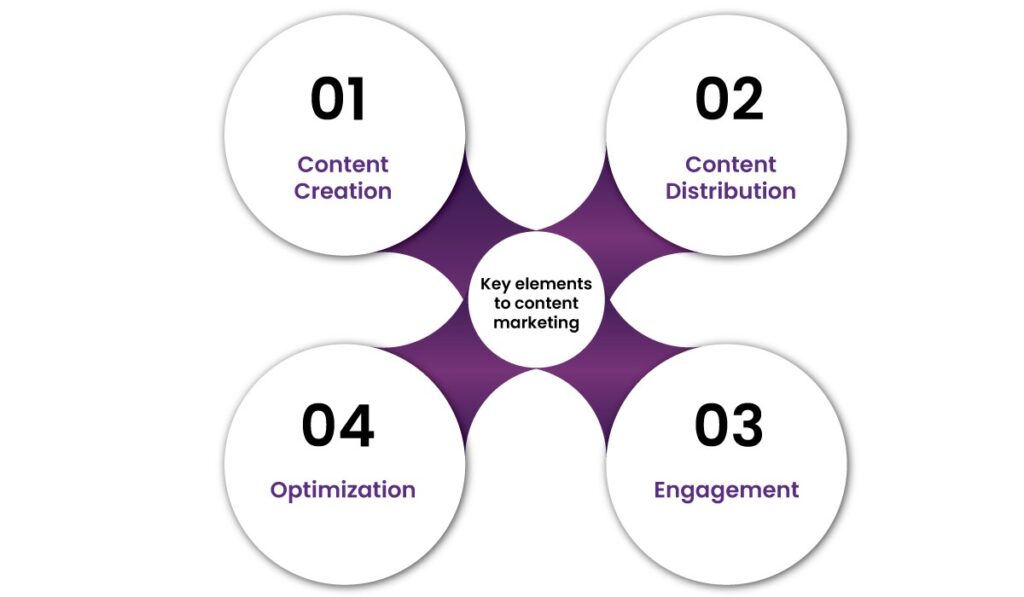
Let’s discuss over the key differences:
The Key Differences: Content Strategy vs. Content Marketing
1. Focus:
- Content Strategy focuses on the “big picture.” It’s about understanding your audience, setting goals, and planning content that aligns with your brand’s objectives.
- Content Marketing is about executing the plan. It’s the day-to-day work of creating and sharing content to engage your audience and achieve your goals.
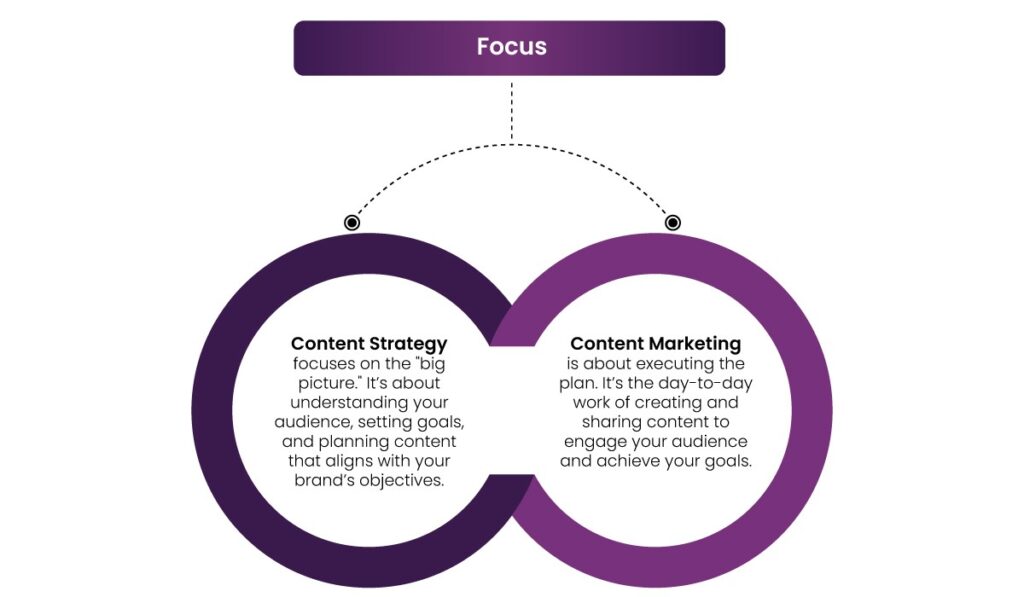
2. Purpose:
- Content Strategy is strategic—it outlines the approach, the tone, the types of content, and the channels you’ll use.
- Content Marketing is tactical—it’s about getting the content out there, engaging your audience, and measuring results.
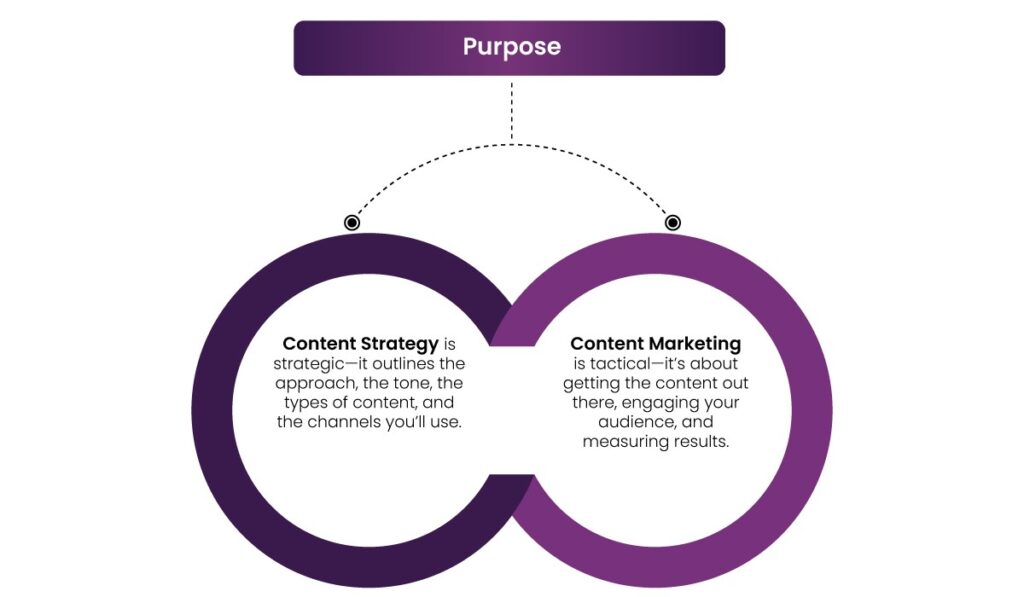
3. Time Frame:
- Content Strategy is long-term. It’s about creating a sustainable framework that guides your content creation for months or even years.
- Content Marketing is short-term and ongoing. It involves implementing and adjusting content over time to see what works best.
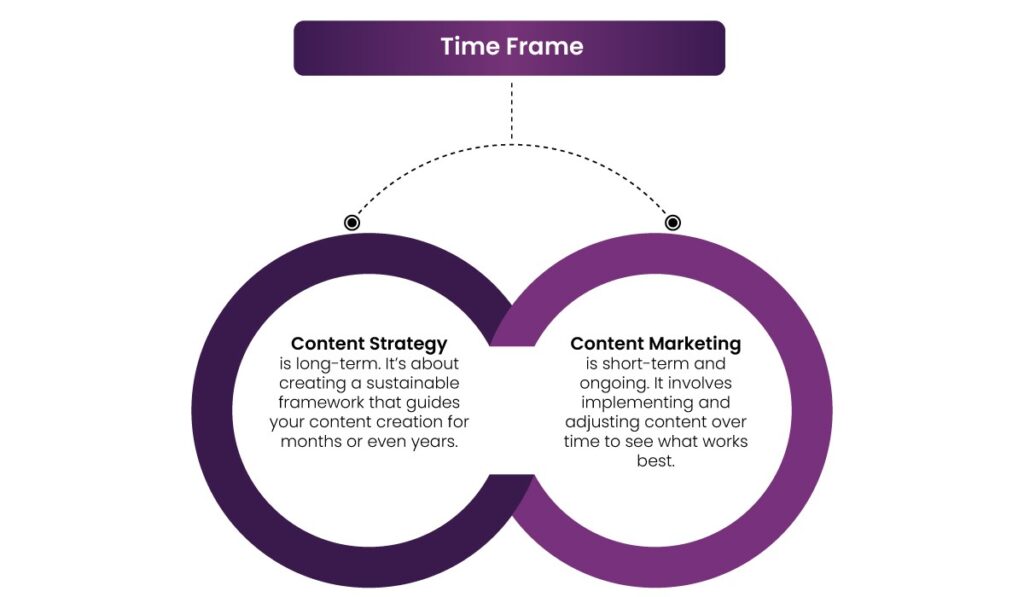
4. Level of Detail:
- Content Strategy is broad and high-level. It covers the “why” behind your content efforts and the overall plan.
- Content Marketing is more granular and specific, focusing on the practical steps and the “how.”
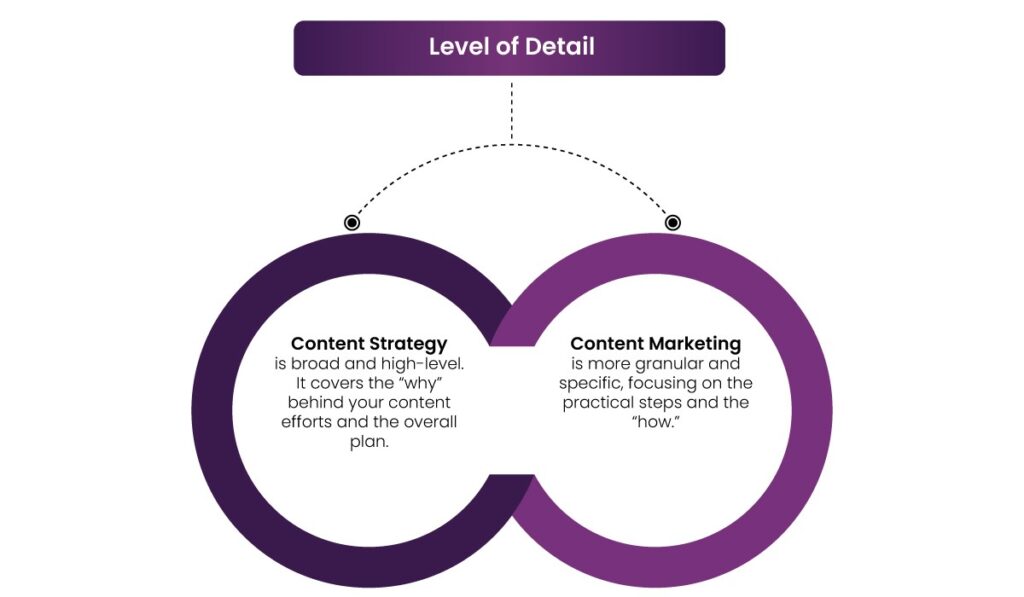
5. Scope:
- Content Strategy encompasses the entire content creation process, including content themes, the brand’s voice, and the overall content journey across multiple platforms.
- Content Marketing is more specific in its scope, focusing on content distribution and engagement tactics to achieve immediate goals.
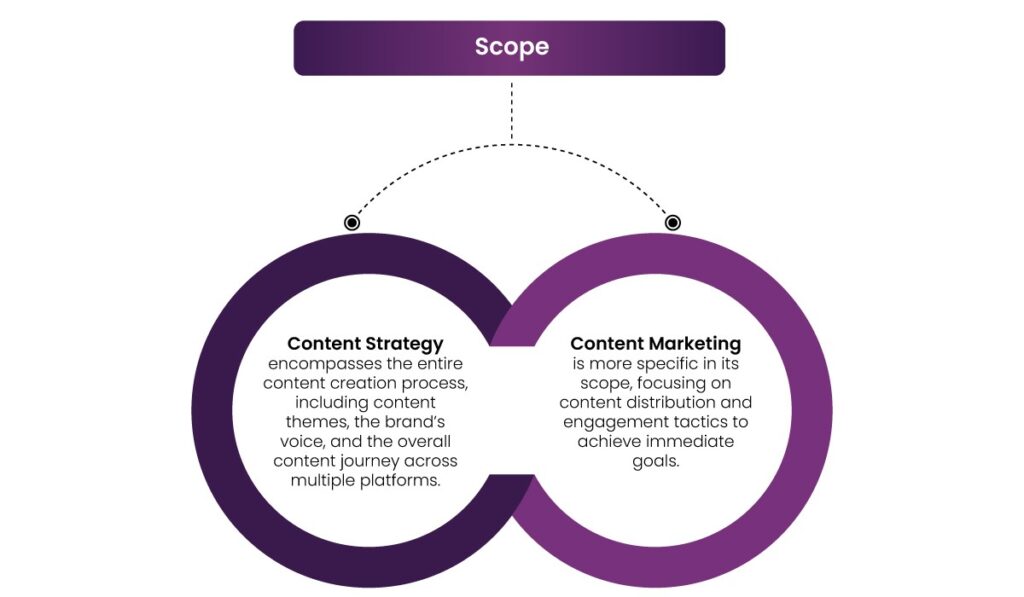
6. Flexibility:
- Content Strategy is generally more rigid because it involves creating a structured approach that aligns with long-term business goals.
- Content Marketing is more flexible, as it adapts to ongoing trends, audience behavior changes, and content performance analytics.
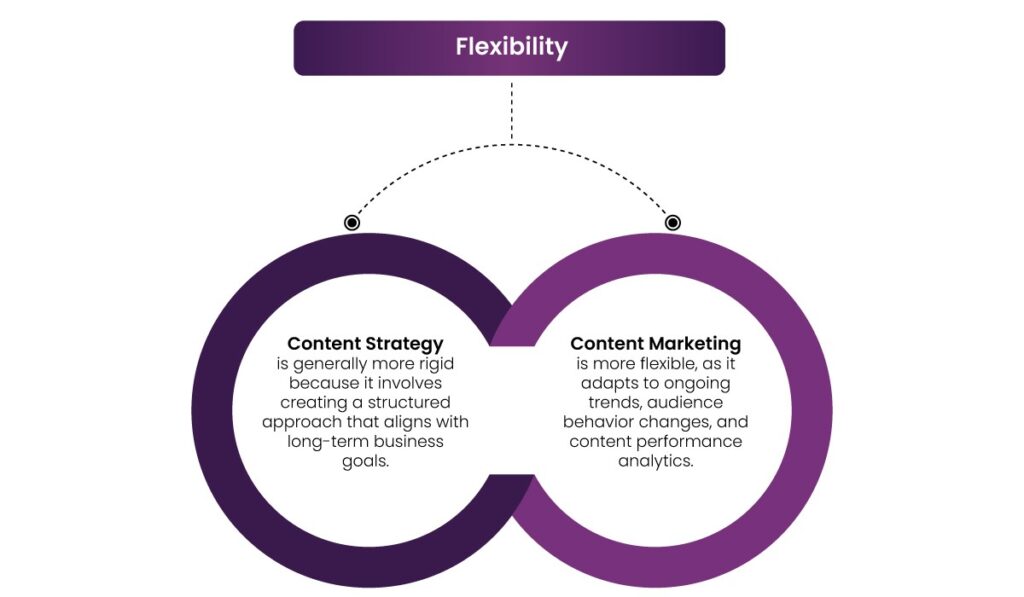
7. Content Calendar:
- Content Strategy is where you plan out long-term content calendars, mapping out major campaigns and content themes months in advance.
- Content Marketing is about executing and adhering to this calendar, ensuring that content is posted consistently and appropriately in line with the content marketing strategies.
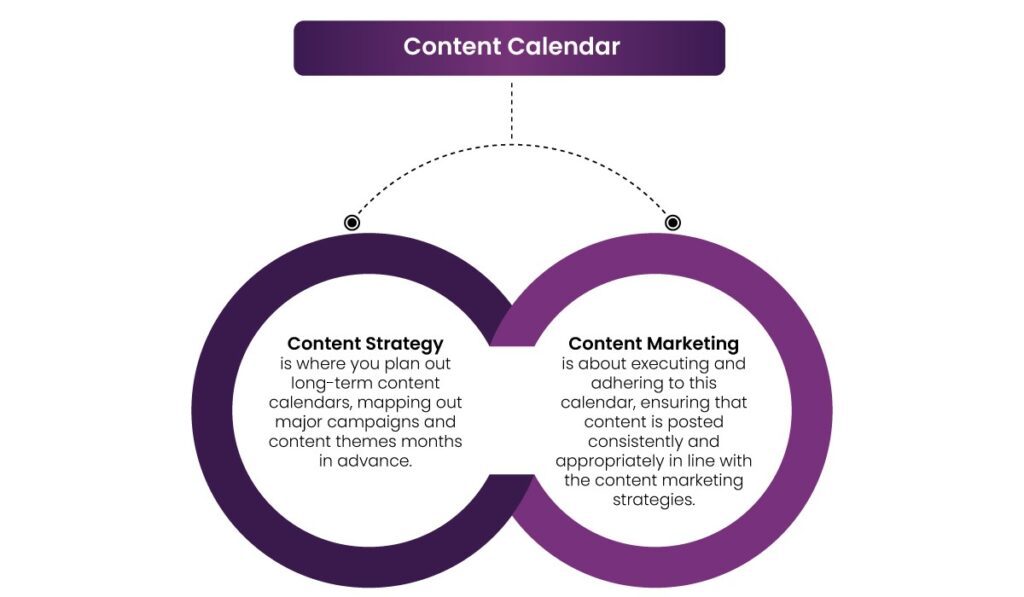
How Content Strategy and Content Marketing Work Together?
While content strategy and content marketing are distinct, they complement each other and work best when integrated. A strong content strategy provides the foundation for successful content marketing efforts. Without a strategy, content marketing can become disorganized, unfocused, and ineffective. Conversely, without effective content marketing, even the best strategy won’t lead to the desired results.
Here’s how they work together:
- The content strategy defines what needs to be created, who the audience is, and what goals the content should achieve.
- Content marketing takes this plan and puts it into action—creating content, optimizing it for SEO, sharing it on social media, and engaging with the audience.
- Content marketers use data and analytics to assess the effectiveness of the content and refine the strategy as needed.
Choosing the Right Content Marketing Company for Your Business
If you’re unsure how to develop a content strategy or need help executing your content marketing efforts, partnering with a content marketing company like Helixbeat can be an excellent solution. A good content marketing company like Helixbeat will not only help you create a content marketing strategies that aligns with your business goals but also execute that strategy through high-quality content creation and promotion.
When choosing a content marketing services provider, look for one that offers a blend of both content strategy and content marketing services. This ensures that your content efforts are aligned with your objectives and executed effectively to drive results.
Conclusion
Though content strategy and content marketing are both necessary components of a brand’s content plan, they serve different roles. Content strategy provides a roadmap for content creation. Conversely, content marketing brings that strategy to life, ensuring the right content reaches the right audience at the right time.
Understanding the difference between the two and how they work together will help businesses create a cohesive content plan that resonates with their audience and drives measurable results. By aligning content strategy and content marketing, businesses engage with right audiences.
If you’re looking to create a strong content strategy or need assistance with content marketing, consider partnering with a content marketing company like Helixbeat that can help you navigate both aspects, creating a tailored plan that drives success for your brand.
Frequently asked question
- How does Helixbeat develop a content strategy for my business?
At Helixbeat, we begin by understanding your target audience, business objectives, and industry trends. We then create a customized content strategy that aligns with your goals, focusing on content themes, platforms, and the best ways to engage your audience for long-term success.
2.Can content marketing work without a strategy?
While content marketing can produce results without a formal strategy, it is more effective when guided by a content strategy. Without a strategy, content can lack direction and fail to achieve the business objectives.
3. Can Helixbeat help me with content creation for different platforms?
Absolutely! Whether it’s blog posts, social media content, videos, infographics, or podcasts, Helixbeat offers content creation across various platforms. Our team ensures that your content is tailored to each platform’s unique audience and format.
4. How does Helixbeat measure the success of content marketing campaigns?
We use a variety of metrics to measure success, including website traffic, social media engagement, conversion rates, and overall audience interaction. We continually track and analyze performance to refine our strategy and ensure the content is effective in achieving your business goals.
5. How long does it take to see results from Helixbeat’s content marketing services?
While content marketing is a long-term strategy, you can expect to start seeing measurable results within a few months. The key to success is consistency, and we ensure that your content is continually optimized for the best results over time.
6.Is content strategy a one-time thing, or should it be updated regularly?
Content strategy should be flexible and updated periodically based on changes in business goals, audience needs, and industry trends. It is not a one-time task but an ongoing process that adapts over time.
7.Should I hire a professional content marketing company?
If you’re struggling to create a solid content strategy or need assistance executing your content marketing efforts, hiring a professional content marketing company can be a wise decision. They can bring expertise and help align your efforts with your business objectives for better results.
8. What types of content are best for content marketing?
The type of content that works best depends on your audience and goals. Blog posts, videos, infographics, podcasts, and social media content are all popular options. Diversifying content formats helps reach a wider audience and engage them in different ways.









